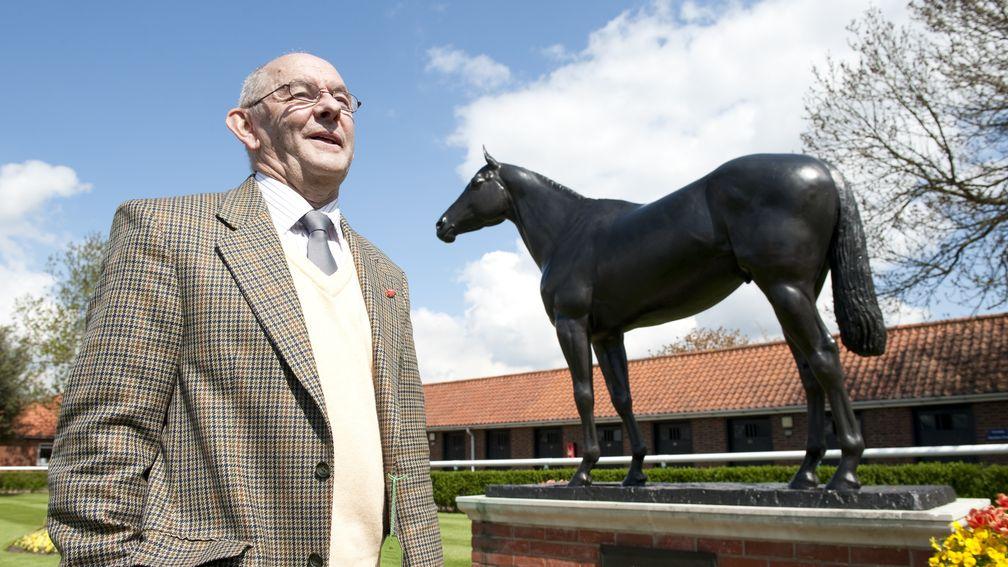Better than Frankel? Reinforcements in the Brigadier's battle for supremacy
Brigadier Gerard's former lad recounts a fascinating life in racing in the 1970s

Brigadier Gerard and Me: A Personal Journey Through Horse Racing
Brigustbooks, £14.99
I'm a massive Brigadier Gerard fan. I took a shine to him in 1970 and my first 'proper' bet was on him to win the 1971 2,000 Guineas. I couldn't say how much I had on, but I remember at the time it seemed like a colossal amount in newly decimalised currency, especially to a nine-year-old with no fixed income.
Of course, he won, beating subsequent Derby and Arc winner Mill Reef and star juvenile My Swallow at odds of 11-2, although I think I nicked a little bit of 6-1.
After that, I 'followed' him everywhere, as he won 17 of his 18 races. He was great, that's for sure, and I'll willingly side with him whenever that old chestnut of a debate 'Who was the greatest racehorse of all time?' crops up. But where I'm a devotee, Laurie Williamson is something way beyond.
He's been banging the Brigadier's drum for as long as I can remember, as a regular contributor to Letters pages and an amateur marketing man with just one product to sell.
I seem to remember once having a Brigadier Gerard fridge magnet, which can only have come from one source. The other day, I received through the post a copy of Brigadier Gerard and Me, so now I have two Brigadier Gerard books and a souvenir Laurie Williamson bookmark for good measure.
Fifty years after his retirement, I still remember the mighty beast fondly, as the best horse I've ever seen, although it doesn't matter greatly to me if nobody else agrees.
Laurie, though – well, this 500-page tome reads less like a vanity project and more of a catharsis, the printed release of half a century of adoration, frustration and an unquenchable desire to set the record straight.
Laurie was Brigadier Gerard's lad from beginning to end. Even in the early days, he was besotted, and he recounts the misery of being stuck on an ill-timed holiday in Italy while his hero ran his first two races. This, after all, was the horse that helped him bond with his sick father; he didn't drink, smoke or fool around much with girls, so the Brigadier was the centre of his world and woe betide anybody who wronged him.
Owner John Hislop wronged him, by insisting on having Brigadier Gerard chained up in his box in the early days, and Laurie never forgot it. This book is his chance to settle that and many other scores, and he does so with a sharp skewer.
Major Dick Hern, master trainer and proper gent, cops a fair bit of flak, but it's Hislop and his wife Jean who are shot down in flames, along with any journalist who failed to acknowledge, or actively disputed, the Brigadier's supremacy, over Mill Reef, My Swallow, Ribot, Sea-Bird, any other horse really; and, finally, Frankel.

That's the nub of the book. We receive a fascinating tour of life as a stable lad amid the archaic, class-bound working practices of the 1970s; there are countless tales of races run and betting ambitions both realised and dashed, and he dissects the mystery of that dire day when he was beaten by Roberto on the Knavesmire. But all roads lead to Frankel and that's a score that has yet to be settled.
Williamson took issue with journalists and ratings from the beginning. He likes historians even less, when they start lazily "trampling all over the great horses of the past", and it's no surprise that he himself rates June 19, 2012 – the day of Frankel's spectacular Queen Anne victory – as "the day the ratings died", to the point where he recalls fishing piles of notes out of his rubbish bin – before his wife Jill had chance to empty it – to begin his quest to right this heinous wrong.
'This is a work of passion; an outpouring
of a love affair that has never died'
There are tables and tables and more tables that quite feasibly prove a point that modern history has decided to ignore: that Frankel ran to a rating of 139 at Ascot that day, rather than Timeform's 144, which isn't a patch on Brigadier Gerard's 1972 QEII effort, however much popular opinion may differ.
It sounds like a victory for the author, which is just as well given the time and effort that have gone into the fight. Frankel is only the seventh best horse of all time, I think is what he's saying, and Brigadier Gerard is the best. And who am I to argue?
This is a work of passion; an outpouring of a love affair that has never died, although the Brigadier left us in 1989. I hope its author has found a little peace as a result of it, although he may equally have stirred up a few more hornets' nests along the way. Arguments about great racehorses are like that: they never truly end.
Read more from RPSunday here . . .
Biography of legendary champion Sceptre and a Harry Radcliffe racing thriller
Karl Burke: Dreaming of that beach in Thailand – but too addicted to horses
John Reid: 'I'd won the Derby but that made my year – it was revenge'
Mick Kinane: 'It doesn't matter whether you win or lose – until you lose'
Steve Cauthen: 'There was real tension with Lester – he couldn't jock me off!'

Sign up to receive On The Nose, our essential daily newsletter, from the Racing Post. Your unmissable morning feed, direct to your email inbox every morning.
Published on 16 July 2022inFeatures
Last updated 17:33, 16 July 2022
- Government says it is working 'at pace' to have white paper measures in force by the summer
- 'The only thing you can do is lie fallow and regroup' - Meades to return with scaled-back operation following blank period
- The Gambling Commission has launched its new corporate strategy - but what are the key points?
- 'It was tragic it happened to Paddy but it was a good thing for the jockeys who followed - good came out of bad'
- Acquisitions, exits and retail resilience - what we learned from Flutter and 888's results
- Government says it is working 'at pace' to have white paper measures in force by the summer
- 'The only thing you can do is lie fallow and regroup' - Meades to return with scaled-back operation following blank period
- The Gambling Commission has launched its new corporate strategy - but what are the key points?
- 'It was tragic it happened to Paddy but it was a good thing for the jockeys who followed - good came out of bad'
- Acquisitions, exits and retail resilience - what we learned from Flutter and 888's results